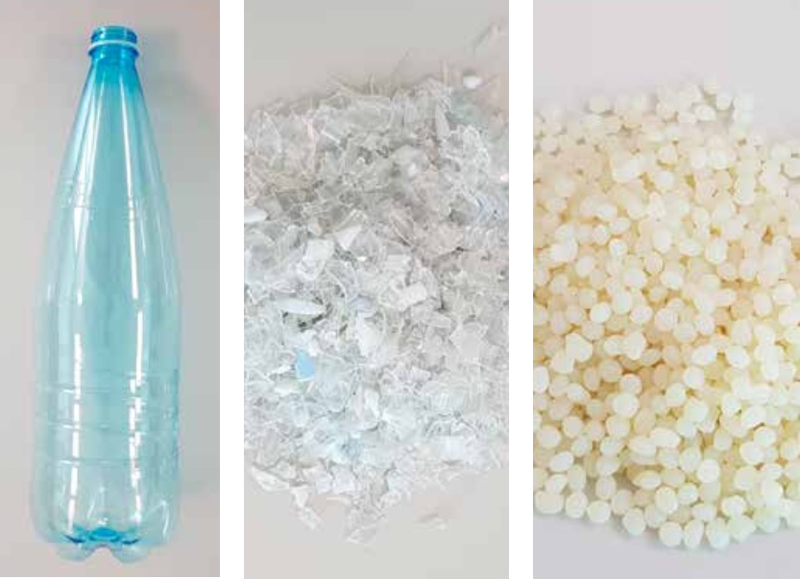SIPOL® HAS DEVELOPED A NEW POLYMER GRADE FOR AUTOMOTIVE APPLICATIONS THAT COMBINES RENEWABLE MATERIALS AND MONOMERS OBTAINED FROM THE CHEMICAL RECYCLING OF PET.
PLASTIX K2019
A long-standing Italian supplier of co-polyester and co-polyamide based thermoplastic copolymers for the production of high-performance engineering polymers and hot melt adhesives, Sipol has been diversifying its product range implementing a real sustainable evolution and, in particular, bio-based and post-consumer materials and their combinations. In order to achieve this goal, the company has established collaborations with universities and research institutes – such as the University of Pisa and the start-up Planet Bioplastic – and is participating in European research projects focused on the development of innovative biopolymers. For example, Sipol is working on the development of high gas-barrier bioplastics for packaging, multi-functional bio-based coatings (ECOAT GA 837863 project, “ECO sustainable multifunctional bio-based COATings with enhanced performance and end of life options”), as well as biopolymers for adhesives, breathable biodegradable films for footwear and the automobile industry and biopolymers for the cosmetics and medical sectors.
Recently, Sipol has also become part of a European public-private partnership aimed at developing innovative high-performance bio-based materials and creating sustainable and competitive value chains.
Co-poliesteri e co-poliammidi da risorse rinnovabili
Thanks to its R&D activities SIPOL® today produces more than 100 different grades of co-polyesters and more than 30 of co-polyamides many of which are obtained from no food-grade renewable resources. All the co-polyamides currently produced by Sipol under the TECHNIPOL® PA brand contain more than 70% of bio-based monomers, byproducts of vegetable oils.
Even among co-polyesters, Sipol offers grades that can be classified as bio-polymers. For example TECHNIPOL® 70, a bio-based polyester that contains more than 60% of raw materials obtained from renewable resources (castor oil). This grade besides being totally biodegradable, is characterized by a low melting point, which makes it easily applicable as an adhesive in the footwear industry, in the textile sector and as base polymer for biodegradable compounds. TECHNIPOL® 061/E is instead an aromatic/aliphatic co-polyester, characterized by medium crystallinity degree and a low melting point. Due to its formulation, it can be used in biodegradable and compostable compounds.
Another product in this range is TECHNIPOL® IP 720, a biodegradable and bio-based co-polyester based on PBS, characterized by high hardness and high melting temperature, which make it the ideal substrate also for cosmetic applications such as scrubs, thus avoiding the problem posed by polluting biodegradable micro plastics in marine environments, in line with the recent orientations of the European Union.
Alongside these established products, Sipol has recently started the production of TECHNIPOL® 232, a new bio-based thermoplastic co-polymer for use in automotive filters.
Bio-based and post-consumer
PET undoubtedly represents one of the most popular polymers in the world of disposable packaging and for this reason, it is often blamed for the problems related to its dispersion in the environment. In Italy, the collection chain of PET bottles is widely organized and –thanks to the selection, grinding, washing and regradation processes – selected r-PET granulate and flakes of good quality are available. In addition to being re-used as a polymer, the reversible nature of the polycondensation reaction (used for the polymerization of the PET), allows PET to be chemically recycled, bringing it back to its main components: purified terephtalic acid (PTA) and mono ethylene glycol (MEG).
The versatility of PET (even with regard to the environment) prompted SIPOL®‘s R&D department to launch a programme geared to increasing the sustainability of some of its co-polyesters. The result was TECHNIPOL® 232, the evolution of an existing product (TECHNIPOL® 32), which is widely used for bonding, sealing and flexible reinforcement of air and oil filters in the automotive industry. To the renewable resource content of 29% – already available in the previous grade thanks to one of its monomeric components obtained from vegetables – the new TECHNIPOL® 232 co-polymer adds about 21% of post-consumer materials, so replacing part of the non-bio-based monomers with others obtained from the chemical recycling of post-consumer PET from bottles. The result is a 50% “circular” co-polyester.
The process developed by SIPOL® keeps the original properties and performance level of the TECHNIPOL® 32 grade (table 1) unaltered and, at the same time, significantly increases its environmental sustainability (table 2), along with some benefits in terms of costs.
TECHNIPOL® 232 is currently under approval at some major European original equipment manufacturers of automotive filters.


